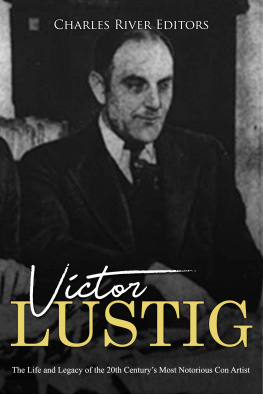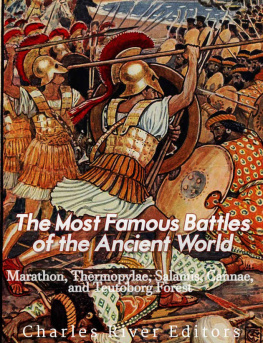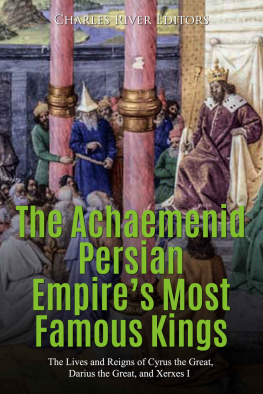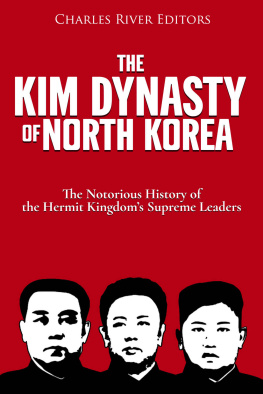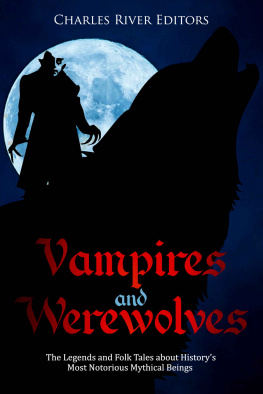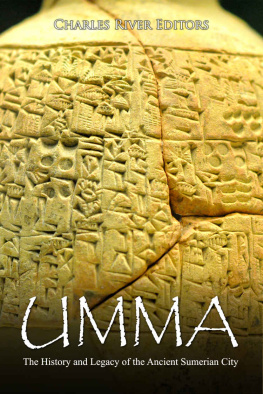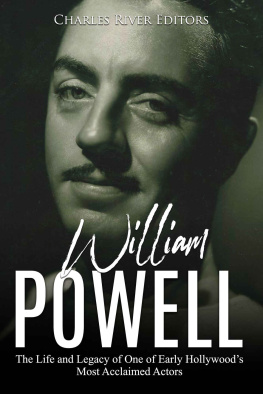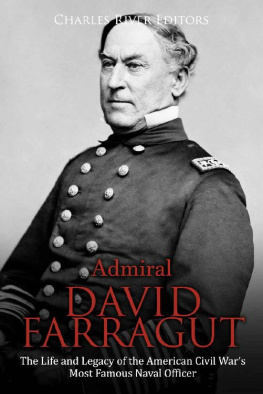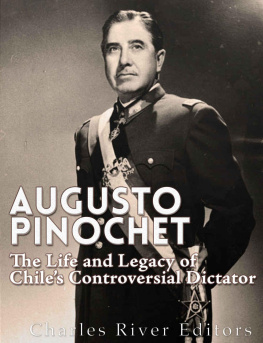Charles River Editors - Victor Lustig: The Life and Legacy of the 20th Century’s Most Notorious Con Artist
Here you can read online Charles River Editors - Victor Lustig: The Life and Legacy of the 20th Century’s Most Notorious Con Artist full text of the book (entire story) in english for free. Download pdf and epub, get meaning, cover and reviews about this ebook. year: 2020, publisher: Charles River Editors, genre: Non-fiction. Description of the work, (preface) as well as reviews are available. Best literature library LitArk.com created for fans of good reading and offers a wide selection of genres:
Romance novel
Science fiction
Adventure
Detective
Science
History
Home and family
Prose
Art
Politics
Computer
Non-fiction
Religion
Business
Children
Humor
Choose a favorite category and find really read worthwhile books. Enjoy immersion in the world of imagination, feel the emotions of the characters or learn something new for yourself, make an fascinating discovery.
- Book:Victor Lustig: The Life and Legacy of the 20th Century’s Most Notorious Con Artist
- Author:
- Publisher:Charles River Editors
- Genre:
- Year:2020
- Rating:4 / 5
- Favourites:Add to favourites
- Your mark:
- 80
- 1
- 2
- 3
- 4
- 5
Victor Lustig: The Life and Legacy of the 20th Century’s Most Notorious Con Artist: summary, description and annotation
We offer to read an annotation, description, summary or preface (depends on what the author of the book "Victor Lustig: The Life and Legacy of the 20th Century’s Most Notorious Con Artist" wrote himself). If you haven't found the necessary information about the book — write in the comments, we will try to find it.
Victor Lustig: The Life and Legacy of the 20th Century’s Most Notorious Con Artist — read online for free the complete book (whole text) full work
Below is the text of the book, divided by pages. System saving the place of the last page read, allows you to conveniently read the book "Victor Lustig: The Life and Legacy of the 20th Century’s Most Notorious Con Artist" online for free, without having to search again every time where you left off. Put a bookmark, and you can go to the page where you finished reading at any time.
Font size:
Interval:
Bookmark:
By Charles River Editors


Charles River Editors is a boutique digital publishing company, specializing in bringing history back to life with educational and engaging books on a wide range of topics. Keep up to date with our new and free offerings with this 5 second sign up on our weekly mailing list , and visit Our Kindle Author Page to see other recently published Kindle titles.
We make these books for you and always want to know our readers opinions, so we encourage you to leave reviews and look forward to publishing new and exciting titles each week.

Never pry into a person's personal circumstances (they'll tell you all eventually). The Ten Commandments for Con Men, attributed to Victor Lustig
The art of the confidence trick is a controversial craft that is as old as time itself. In the early years of civilization, unscrupulous folks bottled and peddled assortments of fake cures and potions. Snake oil salesmen aside, charlatans posed as mystical beings with supernatural powers, promising to end droughts and other misfortunes of the gullible with what were in reality parlor tricks and illusions.
Indeed, throughout history, unabashedly brazen characters managed to make careers out of deception. 17th century Britain, for instance, was terrorized by William Chaloner, the most infamous serial counterfeiter and con artist of his time before he was ultimately bested by Sir Isaac Newton himself. The British trickster posed as a quack doctor and a clairvoyant who dispensed false fortunes (most likely via an early form of cold reading) and bogus healing antidotes, but these were bush-league frauds in comparison to one of his most renowned claims to fame: he once bribed four Jacobite sympathizers to crank out pamphlets regarding King James II's denunciation of His Royal Highness William, and later double-crossed his co-conspirators by tipping off the cops and swiftly decamping with the $1,000 reward.
Confidence women were equally active players in such dirty, fixed games. Doris Payne was a professional pilferer of jewels whose unconventional vocation spanned six decades. Throughout all her hits across the United States, Europe, and Asia, Payne adhered to a simple, yet effective method of operation: she donned stylish, pricey clothes, singled out impressionable male shopkeepers and distracted them with flirtatious small talk, and secretly palmed jewelry with sleight-of-hand tricks. One of the most recent was Frank Abagnale, a career impersonator, former forger of bank checks turned FBI employee, and the subject of the 2002 film Catch Me If You Can .
Despite several famous con men, there is one con man in particular who, despite being frequently overshadowed by various counterparts, managed to pull off capers so audacious that they seemed to come straight out of an adventure thriller. As a matter of fact, the mystery man in question, Victor Lustig, has often been credited with authoring the figurative handbook that modern-day con artists continue to rely on, and his story has been studied or described in countless works of literature, most notably Robert Greene's 48 Laws of Power . Lustig was a notorious master of deception, a dangerously charismatic and conniving fellow, and could boast of exploits as incredible as selling the Eiffel Tower, not once, but twice.
Victor Lustig: The Life and Legacy of the 20th Centurys Most Notorious Con Artist profiles one of the most eccentric personalities of his age. Along with pictures of important people, places, and events, you will learn about Victor Lustig like never before.
Nothing ventured, nothing gained. Old Czech Proverb
As dishonorable as it was, street hustling was if executed properly a potentially profitable trade, and it had become something of an art form by the 19 th century. Among the most popular tricks of the trade was the drop swindle, a crafty ruse most commonly employed in the United States and across the European continent. It relied on an unsuspecting man sauntering down the street, perhaps whistling a jaunty tune, when he spots a plump wallet tumbling to the ground from the corner of his eye. He stops in his tracks, dives into the flurry of moving feet, and attempts to fish out the wallet, but is deterred by another outstretched hand. Unbeknownst to him, the other Good Samaritan had laid the bait himself, and the wallet had been stuffed with a wad of invalid, counterfeit cash. Rather than deliberate over who had stumbled upon the wallet first and therefore had dibs, the dropper, who claims to be running late, suggests that the dupe keep the wallet and collect the reward money from the rightful owner later in return for a smaller sum of money, or some other valuable. On occasion, the patsy would fork over what they believe to be a fraction of the incoming reward money, and the Good Samaritan would disappear into the crowd. The patsy, unable to track down the owner of the wallet, will attempt to seek consolation in the cash inside the wallet, only to realize that the money is no good anywhere. It is only then that the fog is lifted, but by then, the swindler was long gone.
Across the street, a steadily swelling crowd of onlookers may have surrounded a circle of players in the midst of a round of Three Card Monte. The objective of the game is straightforward enough: the bettor must locate the red queen in the trio of cards shuffled by the dealer. Unfortunately for the bettor in question, the game is rigged, designed so as to ensure the house's victory. What's more, the dealer is not the sole manipulator - pulling the strings alongside him is a roper, responsible for reeling in victims, a lookout, tasked with sounding the alarm when a police officer is sighted, and one or two shills disguised as players themselves.
Even those familiar with the scam are at the mercy of these street swindlers. In the event that the player actually places a bet on the correct card, one of the shills makes certain to place an even higher bet on another card. The dealer then claims that only one bet may be placed a time, and when the shill refuses to withdraw their bet, the dealer is left with no choice but to restart the round. Shills may also choose to inadvertently slam into the table, or the remaining deck of cards, thereby nullifying the round. The lookout or the dealer themselves may also conveniently spot approaching police officers in the distance, causing bettors and onlookers alike to scatter in all directions at once.
Indeed, these aforementioned scams and other similar stunts were some of the most universally prevalent rackets back in the day. While these rackets, ethics aside, were moderately lucrative if executed properly, they were small-time, penny-ante hustles compared to those perpetrated by Victor Lustig, a supremely slick and incomparably cunning master of deception who is often touted as the greatest con artist of the early 20 th century.
Lustig was in many ways the antithesis of the stereotypical grifter. He took pride in his appearance and was always impeccably groomed, sporting the finest well-tailored suits, complete with his trademark Homburg hat, stylish walking cane, and dress shoes to match. At the same time, he gave wide berth to the fine line between fashionable and gaudy, making certain to never draw too much unnecessary attention to himself. Lustig was wildly charismatic and approachable, yet he was soft-spoken and selected his words carefully, which allowed him to appeal to and procure the trust of people from all walks of life.
Font size:
Interval:
Bookmark:
Similar books «Victor Lustig: The Life and Legacy of the 20th Century’s Most Notorious Con Artist»
Look at similar books to Victor Lustig: The Life and Legacy of the 20th Century’s Most Notorious Con Artist. We have selected literature similar in name and meaning in the hope of providing readers with more options to find new, interesting, not yet read works.
Discussion, reviews of the book Victor Lustig: The Life and Legacy of the 20th Century’s Most Notorious Con Artist and just readers' own opinions. Leave your comments, write what you think about the work, its meaning or the main characters. Specify what exactly you liked and what you didn't like, and why you think so.

